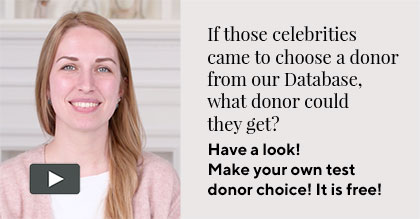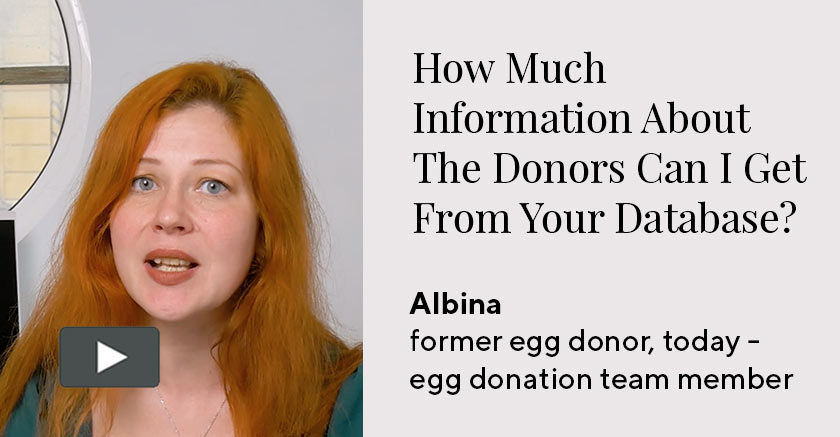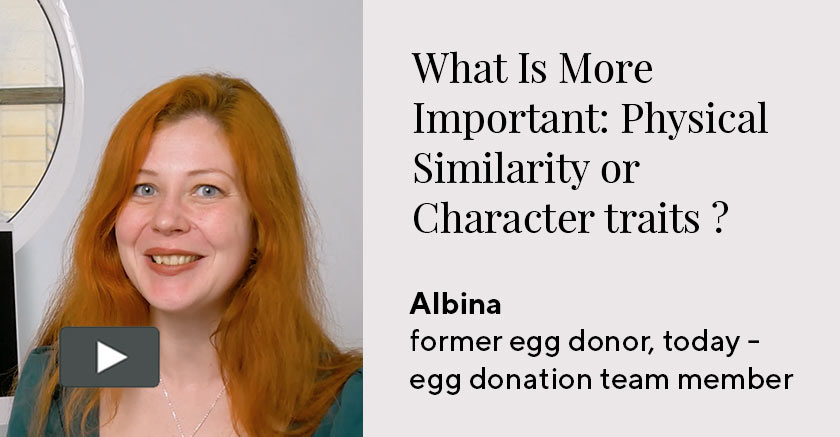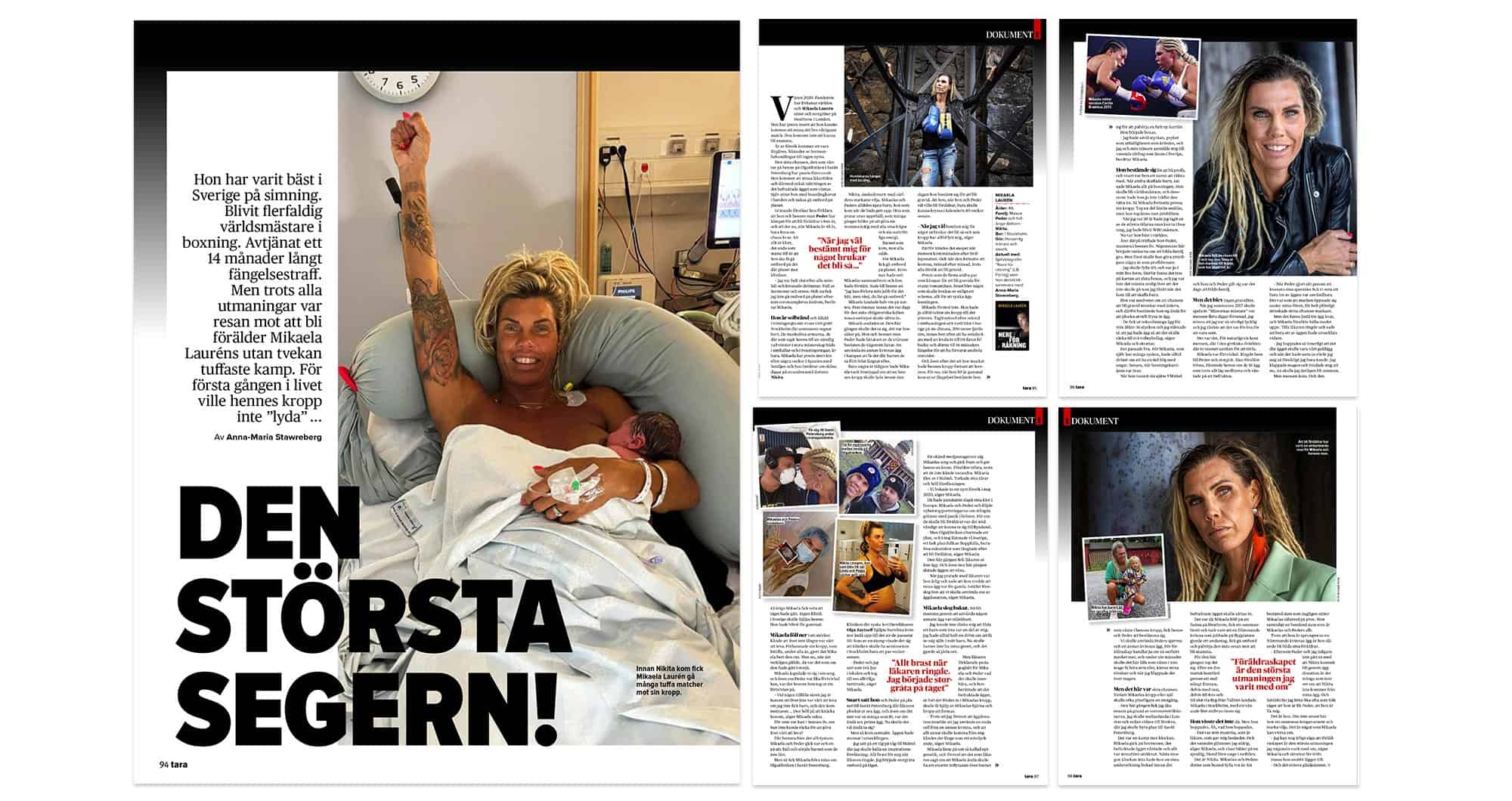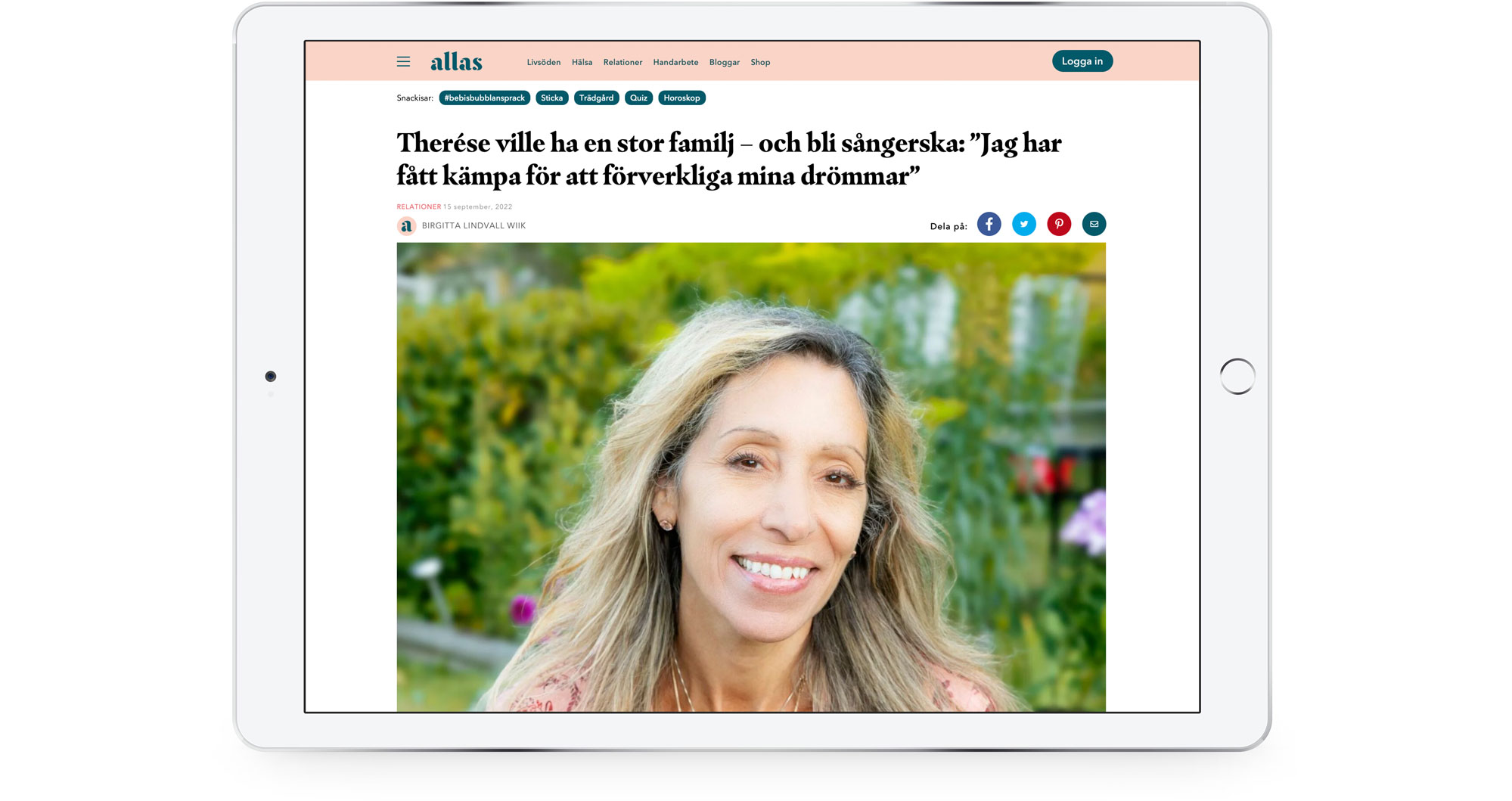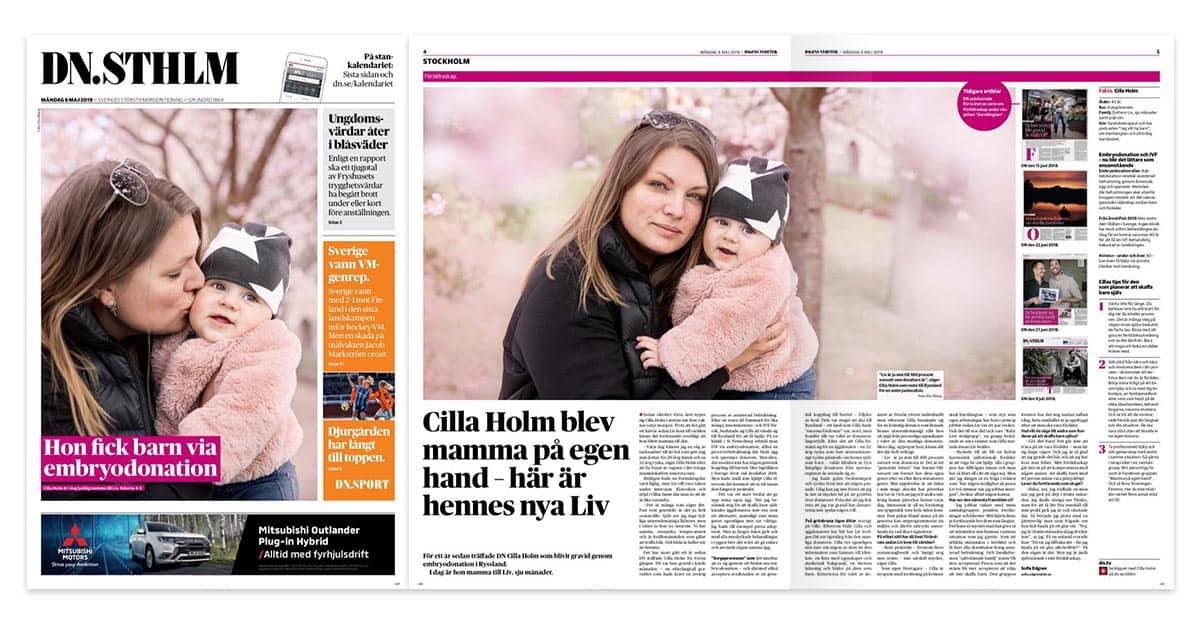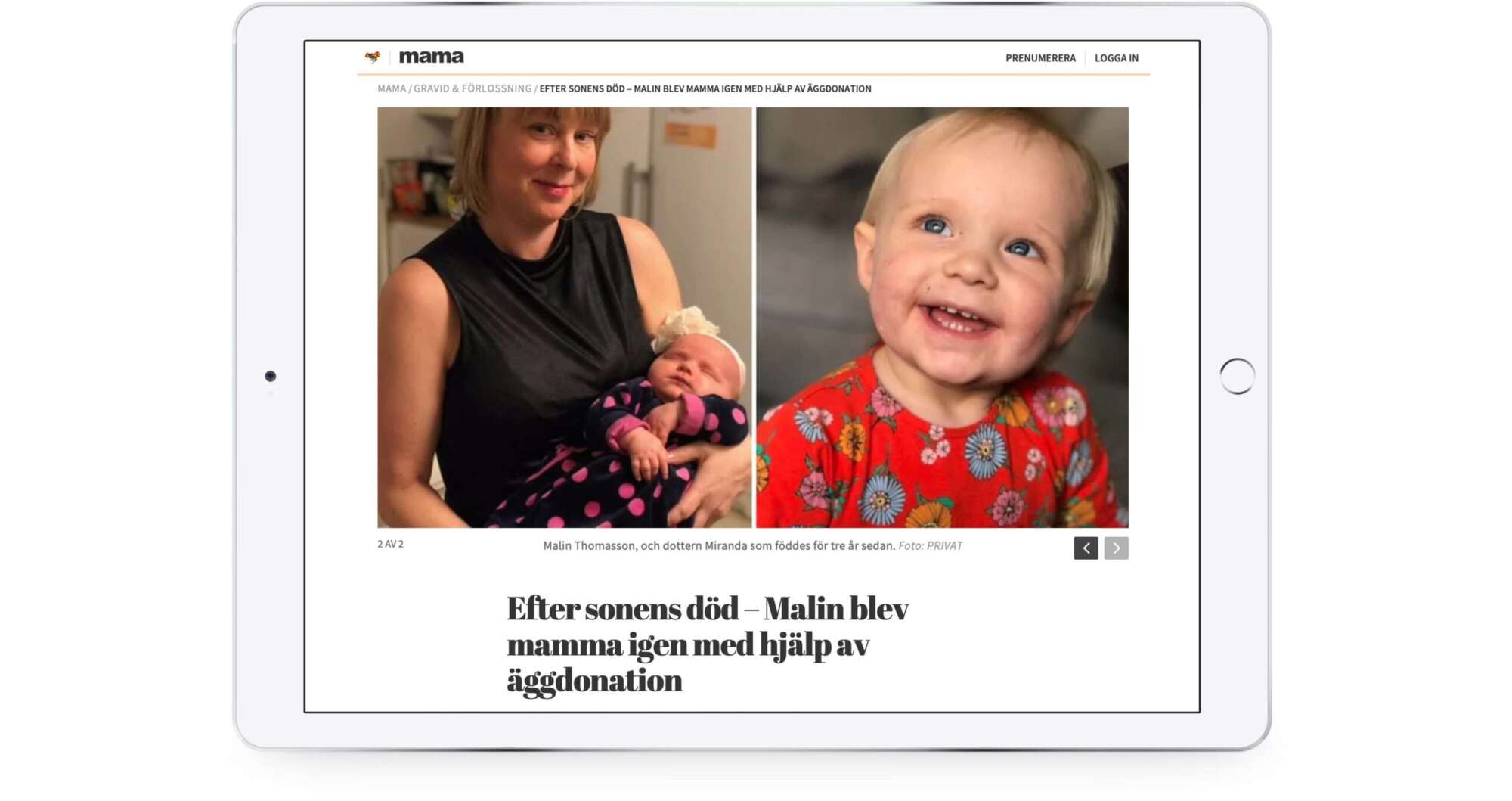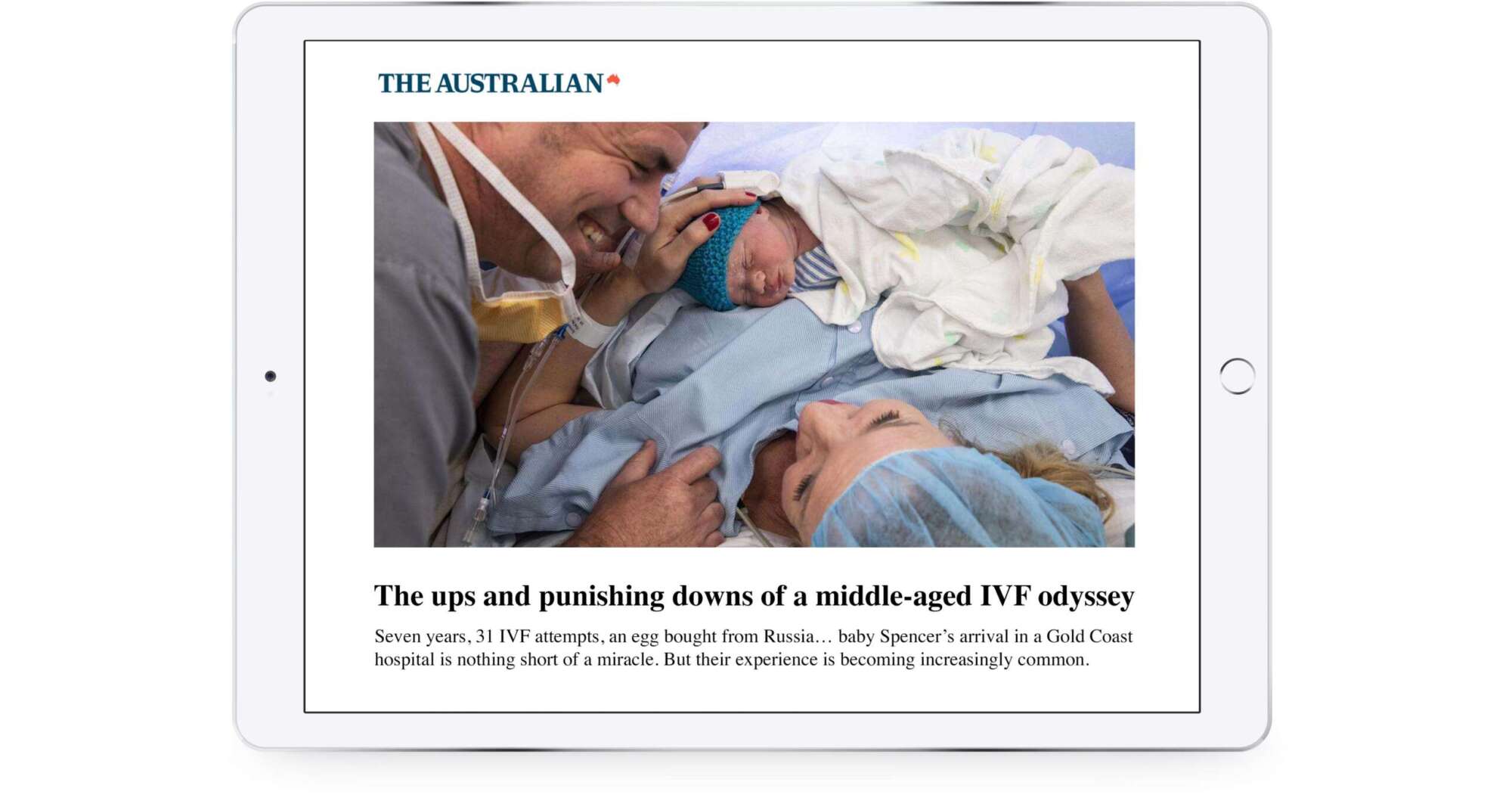"Svenska Dagbladet", Sweden, 7 april 2019. Text: Maria Georgieva, maria.georgieva@svd.se | Photo: Denis Sinyakov
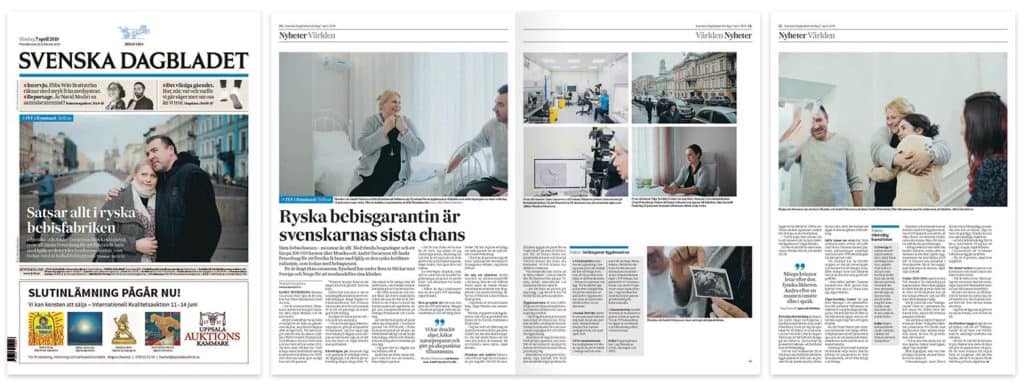
Translation to English
Bet all in Russian baby factory
The last baby chance – now they are investing everything. With empty savings and a loan of SEK 300,000 Monika and André Oscarsson goes to Saint Petersburg for trying to have a child with help of the Russian fertility industry, which attracts with baby guarantee. They are far from alone. Russia has for many years been looking at Sweden and Norway to market their clinics.
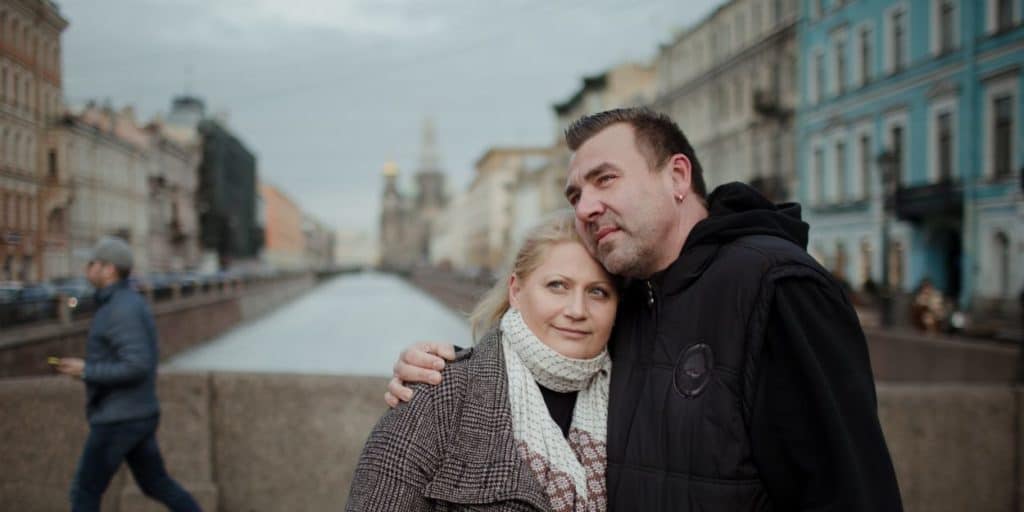
Monika and André Oskarsson from Kristianstad are in Russia for an egg donation. The clinic that performs the procedure receives around 25 persons every week. More than half of the patients are from Scandinavia
Photo: Denis Sinyakov
Saint Petersburg Monika Oscarsson shows a blanket that she has crocheted together with her husband.
- These are grandmother squares. The flower in the middle he has made on his own, says Monika and smiles at André.
Making the baby blanket was a form of therapy to still a common longing, a boundless desire for a child. Because this is something they lack in the idyll of Färlöv outside Kristianstad.
They met in the late 1990s and have been a couple since 2012. Their tours within the health care system have been many since the fertility investigation started, when Monica was 38 years old. As time went by, it was considered she was too old.
"When you are older it takes longer to get pregnant”, she used to hear.
Therefore she was not allowed the state funded test tube fertilization. According to today's recommendations the woman should be maximum 40 years old and the man 55 years to undergo assisted fertilization.
They say they have tried everything — and they are not alone.
- We have drunk algae, munched herbal products, had acupuncture together. I've been lying down with the legs on the wall, with the butt half a meter up, trying to avoid drain of sperm or embryo, says Monika with a good mood.
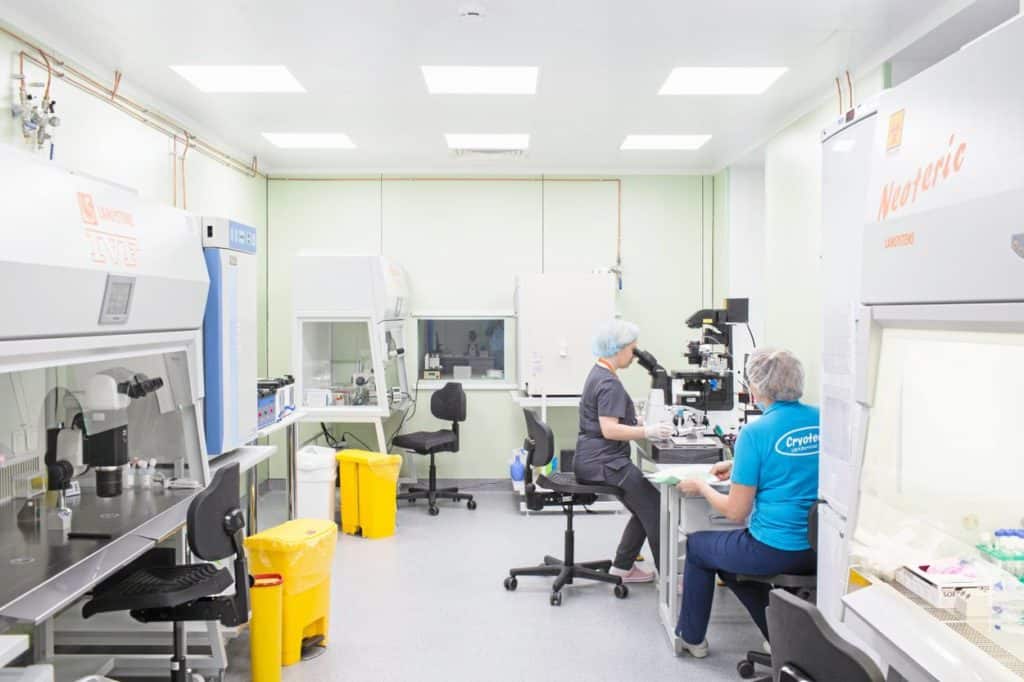
Anna Gusareva and Svetlana Shlykova work in the laboratory at the fertility clinic in Saint Petersburg. The donated egg visible on the screen belongs to Monika Oskarsson
Photo: Denis Sinyakov
The demand for donated eggs and sperm are significantly larger than the supply, and waiting for treatment creates long queues. Time runs out for many people who want children, and the queue time varies depending on where in the country you live.
- For both mother and child there are bigger medical risks when you are over 40 years old. The parents should be able to take care of the child throughout the childhood, says Åsa Sandgren-Åkerman, who works at the Swedish municipalities and county councils.
All this contributed to that the couple searched medical assistance abroad. In Denmark two IVF-trials were made, in Poland the couple had plans to do a fertility study and a third treatment was discontinued when Monika began to question the quality of her eggs.
- I went straight into the wall and was home bound for two years.
André has already a daughter who lives with her mother, his former partner.
- It's my dream to have more than one child. I remember I was vacuum cleaning at home, turned around and felt that there was a small boy sitting on the vacuum cleaner, says André with tears in his eyes.
They considered adoption, however this also takes time and has limits because of the couple's age. And the economy was already under pressure.
- If you are in an adoption queue you can't do IVF at the same time, says Monika.
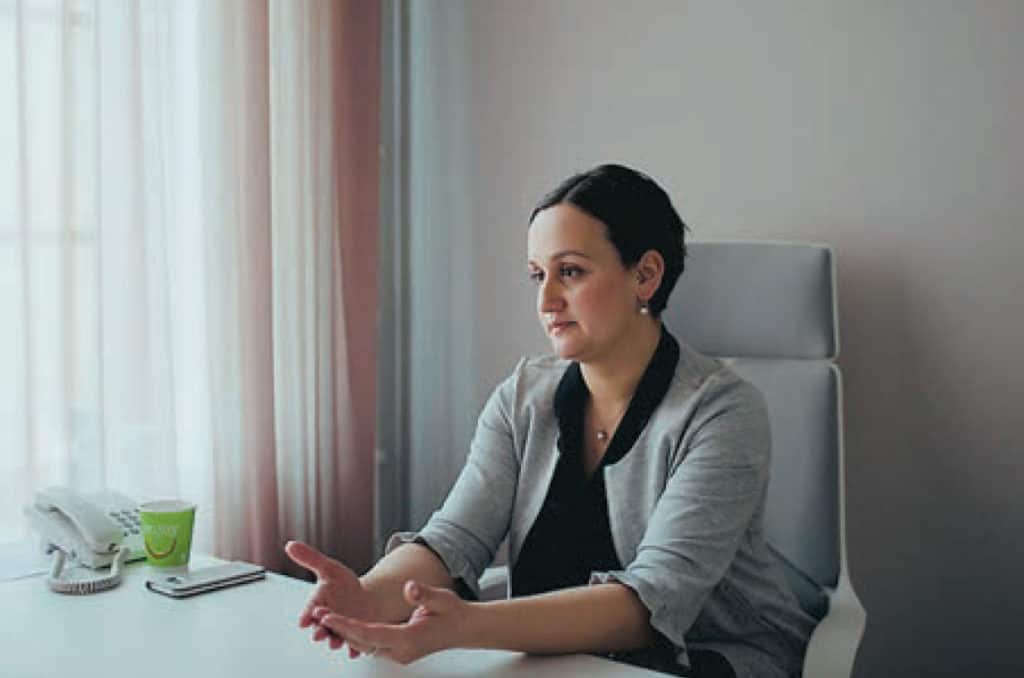
Doctor and owner of the clinic, Olga Zaytseff. About 25 persons come to her clinic every week.
Photo: Denis Sinyakov
She googled on what you can do when IVF does not work. She was active in Facebook groups, read about miracle babies and involuntary infertility.
Finally she read a post about baby guarantee at a Russian clinic in Saint Petersburg.
- How could they guarantee me a child? If we didn't succeed we would get the money back. I felt relief.
They saw that the clinic would organize an information meeting in Gothenburg, they went there and met among many others a Swedish woman who the clinic uses as a forefront person in its marketing. After ten IVF trials the woman had become pregnant.
- I felt we were at home, says Monika about the seminar.
When buying the egg donation package, and in case there is no pregnancy within three attempts, the treatment is refunded by 80 percent.
- I find it hard to imagine they should market the guarantee so hard if it didn't work. If there was a case that did not succeed, it would destroy their reputation, says Monika.
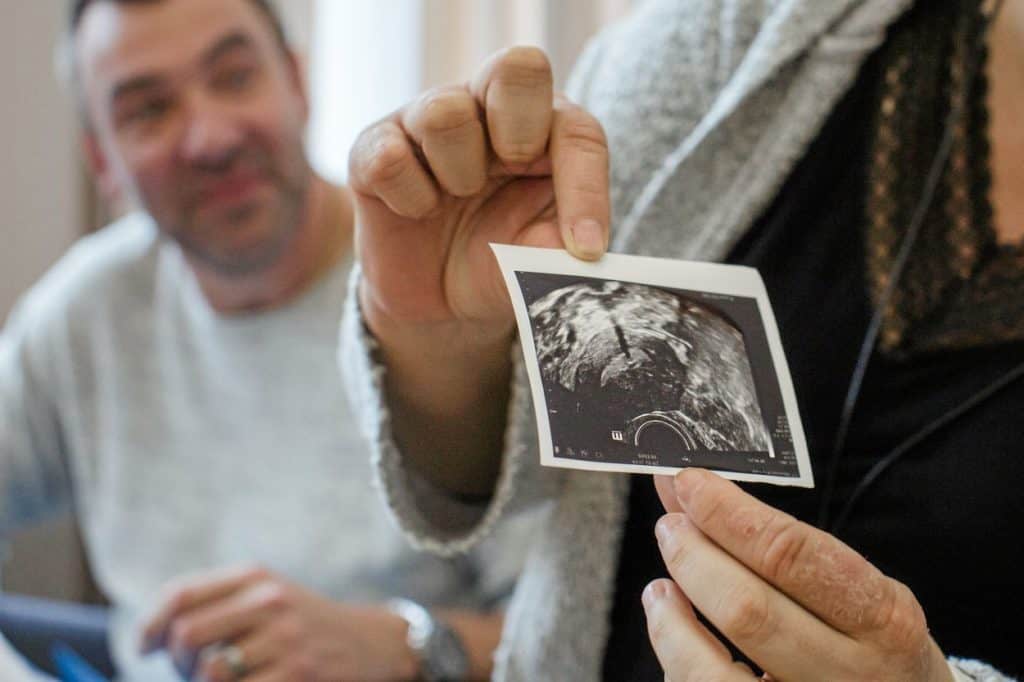
Monika and André Oskarsson proudly show the ultrasound image
Photo: Denis Sinyakov
Facts | How egg donation works
- At the beginning of the year a law change was introduced in Sweden that made it possible for involuntarily childless to get pregnant with double donation – donated sperm and eggs. At the turn of the year the possibility also opened for private clinics to carry out egg donations, but they have to search permission from the National Board of Health and Welfare.
- Since 2005, lesbian couples are allowed to undergo treatment with donated sperm. Single women got the same opportunity in April 2016.
- For singles turning to a private clinic in Sweden has been an alternative to the long waiting times. Fertility Center Stockholm together with five other Swedish clinics are part of IVF-Sweden. They have conducted 45 inseminations and made medical investigations of 90 persons since the law was introduced. Today more same-sex couples undergo treatment than heterosexual couples.
- Insemination means that the woman is inseminated with donated sperm. In an IVF treatment the egg is taken out of the woman and fertilization is performed in a laboratory.
Source: Government Offices: Council of Ministers' Council (2018), Parliament and RFSL.
Monica's and Andrés invoice, as SvD has read, ended up of about SEK 196,000. The clinic states that the couple received a "substantial discount" of approximately SEK 31,000.
To be able to pay the couple has mortgaged their house, and the loan of SEK 300,000 will cover all costs. SEK 60,000 has been donated by friends.
What the total cost will be is still uncertain – they may need go to Russia several times. Visa, hotels, overheads and medicines are paid separately.
- That there is a guarantee makes me feel safe – I know we have two more trials if this one fails.
The egg donation is not risk-free. Due to previous complications Monika's case is considered a high-risk pregnancy.
- Before the egg donation my body is put on hold. The body is plunged into a clinical menopause three months before the medical procedure to prevent ovulation.
André has a kind of chromosome break in his sperms, which means that it is almost impossible for him to have children with a woman naturally.
But the doctor and the owner of the clinic, Olga Zaytseff, believe anyway that there will be no problem for the egg to be fertilized. Therefore Andrés sperm is used instead of buying sperm via the clinic.
- Why cut off the whole arm and have everything donated when you just need an egg donor? says Monika.
They know this is their last chance. Monika is 45, and André 48.
A cool afternoon the couple strolls along the main street in Russia's second largest city, Saint Petersburg. They are on their way to the pharmacy to retrieve medicines, and have been here for over ten days while waiting for the fertilized egg to be inserted. They have bought a gift for the baby – a necklace with a Fabergé egg.
It was Tsar Alexander III of Russia who ordered the first egg by Easter 1885 as a gift for his Danish wife, Maria Feodorovna. Inside it enameled the egg a golden surprise was hidden.
Before the trip there was great concern. Monika worked extra in addition to her job as a teacher. The stress meant psychic strain and at the same time she tried to lose weight before the IVF treatment.
Once on the spot they have tried to relax, go to restaurants and do tourist things to dispel anxiety. After many laps, the clinic has selected a donor that the couple has approved.
- She seems perfect. In her handwritten letter she put hearts over the i:s. Just like me, says Monika.
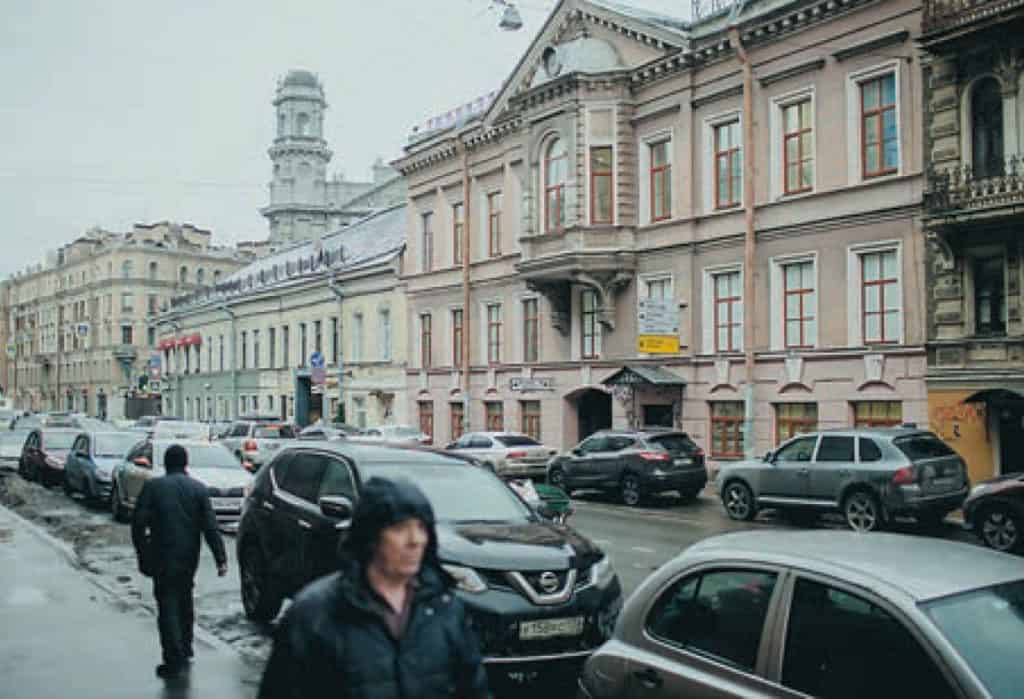
OLGA Fertility Center fills several floors in a turn of the century building in Saint Petersburg
Photo: Denis Sinyakov
OLGA Fertility Center fills several floors in a turn of the century house where patients are welcomed by chandeliers and gray colors on the walls. The couple is here for insertion of the fertilized egg, which is now after five days said to be of the highest quality.
An expensive facade beside shops with Russian chocolate, elevator music and luxury sofas. It looks like a newly renovated spa, not a medical clinic. The Swedes are met with hugs by the employees.
About 25 persons come to the clinic every week. More than half of the patients are from Scandinavia, usually from Norway and Sweden.
Facts | Involuntary infertility
- In Sweden almost half a million people in childbearing ages are involuntarily childless, approximately 15 percent off all couples trying to have children do not get pregnant when they want to. Donation should be altruistic, that is, a donor cannot get compensation for the donation but donors should have their overheads covered.
Source: Reproductive medicine center in Skåne, at Skåne University Hospital
The clinic attracts customers with a database of 600 egg donors, of which 200 are described as active to choose from. The future parents should be able to choose the right donor based on their priorities.
- Many women are looking for physical similarity, others for a degree in math or a language. Egg donation was not allowed in 2005 when we started looking for patients in Scandinavia. Now it's legal, but the queues are huge, says Olga Zaytseff.
During 2015–2018 as many as 796 Swedes were registered for treatment on her clinic. 584 of them are reported to have become clinically pregnant. But it is difficult to get concrete answers to how many women have given birth after the clinic's help.
This is where the "baby guarantee" comes in – the patient's needs are considered to have been covered only when the child is born, otherwise the woman gets money back.
Whether everything succeeds is mainly depending on the woman's age. Usually patients need two attempts with egg donation or embryo adoption before they get pregnant. But it varies.
- We can't know beforehand how one particular sperm works with the eggs, says Olga Zaytseff.
After the procedure, which was over in a few minutes, Monika drinks tea and exhale.
The surprise inside Maria Fjodorovnas Fabergé egg, the present she got from the tsar, is said to have been a golden egg. Monika now has her own gold eggs, she says.
- Out of eight fertilized eggs we got four in AA quality. So I have one AA egg in the stomach, says Monika.
In the laboratory we see her fertilized eggs on a screen.
- Now we are pregnant, she says hopeful.
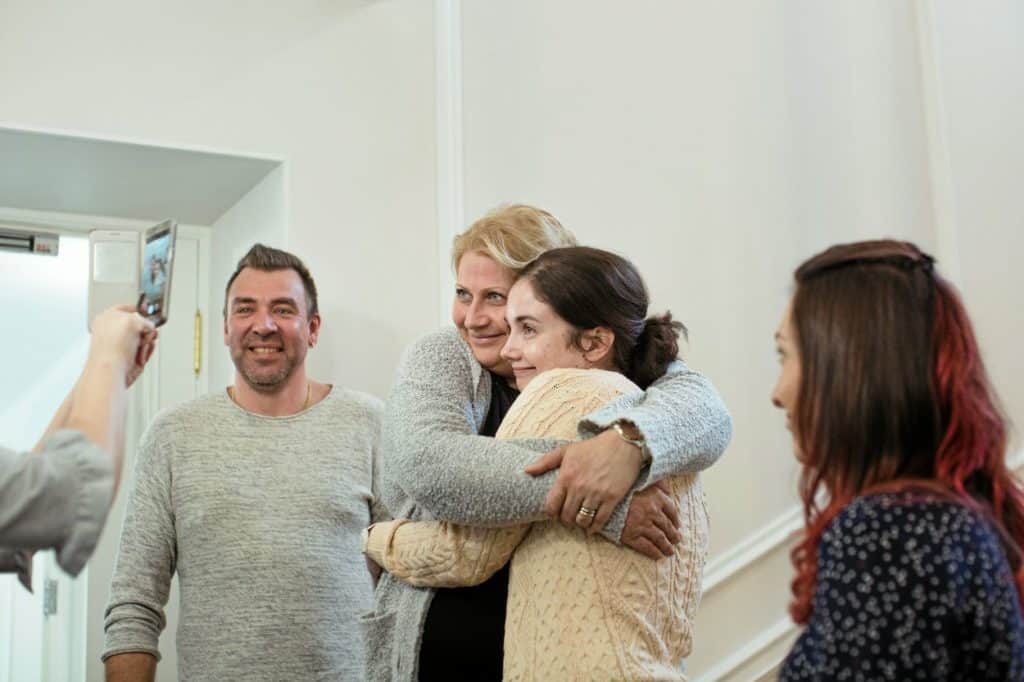
Hope and dreams of a child. Monika and André Oskarsson in Saint Petersburg. Here together with the coordinator at the clinic, Alla Schatzkova
Photo: Denis Sinyakov
Now, weeks of syringes with hormones are waiting that, among many things, will keep the fetus alive.
- This is what we have been waiting for.
I don't want to miss this trip, says André expectantly while carrying her handbag.
Monika wants to write a flip book for the child about their journey, to tell the future child about how it came to the world. She knows how the book will begin.
- I got an egg as a gift from another woman, and this made you.
They are trying to put future concerns on the shelf, and know that the "baby guarantee" could be profit or loss, but are at the same time aware of the risks.
- Now we go for this. It is the last trial we do. If it doesn’t work there is not much more to be done, and we have to come to some form of acceptance. If it doesn’t work we'll take that later. Now the focus is on a child, she says.


